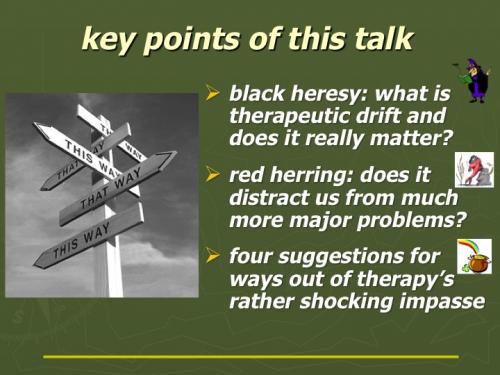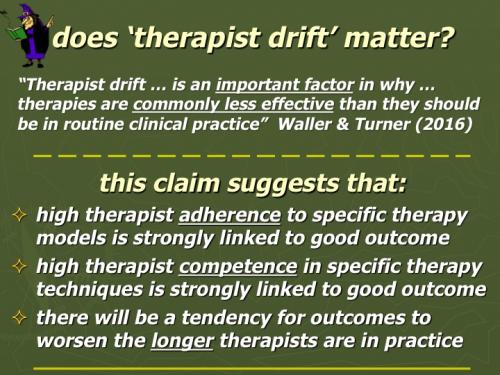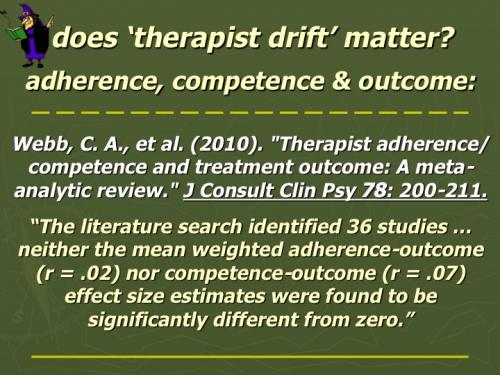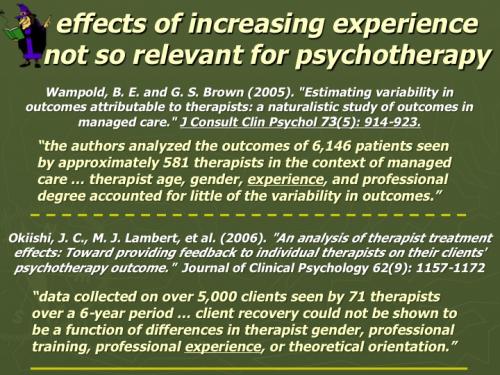Therapist drift: black heresy or red herring - maybe not so important?
Last updated on 28th November 2016
I'm scheduled to give a talk at the Psychologists Protection Society AGM entitled "Therapist drift: black heresy or red herring?". It seems the society has a Continuing Professional Development arm. They invite people to give lectures (there are a couple at this AGM) and then post them onto their Professional Practitioner online resource. I was approached to talk and given a list of eight potential topics to choose from. I said I'd talk on "Therapist drift", not least because I had come across Glen Waller & Hannah Turner's recent article "Therapist drift redux: Why well-meaning clinicians fail to deliver evidence-based therapy, and how to get back on track" and I wanted to have an opportunity to explore the issues they were presenting more thoroughly. Though as you can see from the "Key points" slide below, the talk fairly rapidly morphed into a rather larger overview looking at the effectiveness of psychotherapy more generally:

In the first dozen slides of the talk I look at the first question "Black heresy: what is therapeutic drift and does it really matter?". Here's a link to the twelve slides (and here's a link to the whole sixty nine slide talk). Basically I argue that, if therapist drift is "an important factor in why ... therapies are commonly less effective than they should be" (Waller & Turner) then high therapist adherence and high therapist competence in particular therapy models should be strongly linked to better outcomes. Presumably too, if therapist drift is a common cause of decreased effectiveness, we would expect therapists as a whole to tend to "drift" more and decrease in effectiveness more the longer they have been in practice.

Well currently the key article on links between adherence, competence & outcome seems to be Webb et al's 2010 paper and the results of their meta-analysis are very clear:

There are other more recent papers that speak to this issue - see, for example, Weck et al's "Treatment failure in cognitive-behavioural therapy: therapeutic alliance as a precondition for an adherent and competent implementation of techniques" and Tschuschke & colleagues' "The role of therapists' treatment adherence, professional experience, therapeutic alliance, and clients' severity of psychological problems: Prediction of treatment outcome in eight different psychotherapy approaches. Preliminary results of a naturalistic study." But these further studies serve to underline the weaknesses of any adherence/competence/outcome associations.
What about experience/outcome links? Well a sit up and blink study here is Choudhry et al's 2005 paper "Systematic review: the relationship between clinical experience and quality of health care" with its abstract reporting "Overall, 32 of the 62 (52%) evaluations reported decreasing performance with increasing years in practice for all outcomes assessed; 13 (21%) reported decreasing performance with increasing experience for some outcomes but no association for others; 2 (3%) reported that performance initially increased with increasing experience, peaked, and then decreased (concave relationship); 13 (21%) reported no association; 1 (2%) reported increasing performance with increasing years in practice for some outcomes but no association for others; and 1 (2%) reported increasing performance with increasing years in practice for all outcomes." Wow ... BUT this is a study on physicians. So choose your medical practitioner with care, maybe be cautious about older doctors.
What about psychotherapists? Is there are a similar pattern of deteriorating effectiveness with age ... possibly due to "therapist drift" or "therapist failure to update"? Well no ... there isn't:

Waller & Turner's claim that "Therapist drift ... is an important factor in why ... therapies are commonly less effective than they should be in routine clinical practice." I don't think that current research evidence supports this statement. It seems to me less "black heresy" and more "red herring". However, as the slide above highlights, we do face major problems as psychotherapists when we consider, for example, Okiishi et al's finding that "client recovery could not be shown to be a function of differences in therapist ... professional training, professional experience, or theoretical orientation". Now this looks like a really significant problem. For more about these major challenges to our field, see the next blog post in this sequence - "Psychotherapy is helpful but has developed shockingly poorly over the last thirty years".

Therapeutic Drift
Submitted by Guest (not verified) on Sun, 06/11/2016 - 21:28.
The 69 slides were well worth a read, lots and lots of food for thought
Therapist Drift
Submitted by Courtenay Young (not verified) on Thu, 03/11/2016 - 12:20.
This has implications of medieval back-sliding or heresy: we train in a particular 'method' or 'modality'. Hopefully this is reasonably 'evidence-based' and effective (the two are not the same). Most psychotherapists - and not just the one's I know - 'extend' their way of working over their professional career - a raison d'être for a good choice of CPD topics. This is not "drifting" away from their original method, this is healthy growth and development - and we should welcome it.
Maybe one of the reasons why psychotherapy has not developed as fast as it should over the last 120 years is because of this 'insistence' on a form of purism, or in the rigidity of the 'methodologies'.
There are - of course - obvious dangers as well: adding in a new (say esoteric or body-oriented) technique doesn't make you into a transpersonal psychotherapist or a somatic psychotherapist: there is a lot more to it than that and we can suddenly become dabbling amateurs, out of our depth, when dealing with a different client group, or set of 'difficulties' that we are not fully prepared for, cognisant about, or trained in.